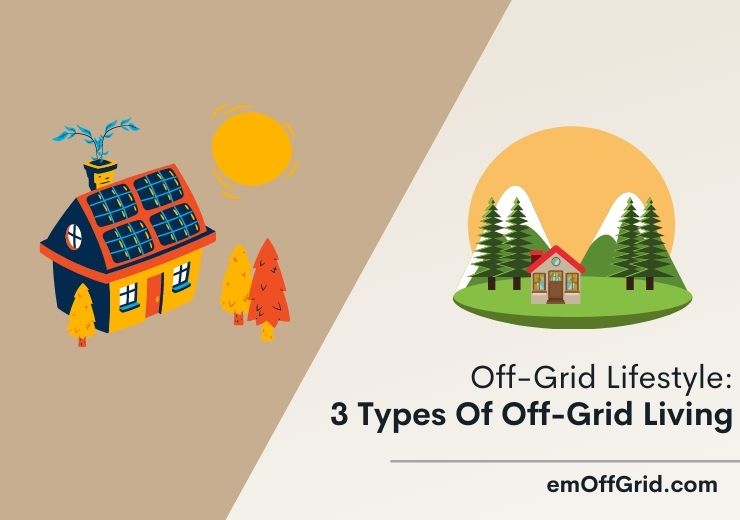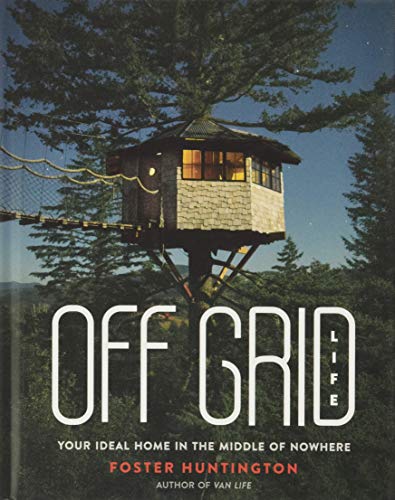Off-grid living has been the talk in many neighborhoods in the past. People all over are talking about lifestyle changes.
Some for personal satisfaction, while some do it to gain peace of mind and reduce environmental footprints.
Whichever the reason, you need to understand what living off the grid means.
In this article, we will discuss off-grid lifestyle and their meaning. We have researched and now want to make everything clear for everyone aspiring to go off the grid. Read on for details.
Contents
What Exactly Is Living Off The Grid?

Many of us live a modern life and do not care how it operates.
We switch on lights, flush toilets, or turn on our refrigerator but do not ask ourselves how the electricity was generated or how the water flows into our homes.
We do not care how wastewater gets out. All we know is that life moves on.
If you are reading this piece, then there is a high chance that you already have some bits of information about off-grid living.
But what is the meaning of living off the grid? You can visualize off-grid living as an island with no connection to the mainland.
In simple terms, off-grid living means surviving on the resources that you harness from the land you own. Food, water, medication, electric power, and other things should be produced locally by yourself.
Most off-gridders plant crops, keep livestock, hunt, dig wells, and use herbal medicine to survive.
You are disconnected from the utility services when you adopt an off-grid lifestyle.
Off-Grid Lifestyle

Off-grid living is divided into two categories: rudimentary and modern off-grid living. When going off-grid, you need to choose between the two or combine them so that you have a taste of what each has to offer.
It depends on your personal preferences to choose what works for you.
What does the different off-grid living lifestyle mean? Let’s find out!
Living Off the Grid: The Practical Guide to Sustainable Energy (IMM Lifestyle Books)
- Alan Bridgewater (Author)
- English (Publication Language)
- 192 Pages - 12/31/2025 (Publication Date) - IMM Lifestyle Books (Publisher)
Rudimentary Off The Grid Living
The dictionary meaning of the word rudimentary is limited to basic principles. In another context, the word means imperfectly or incompletely developed.
When used in off-grid living, we can relate it to a remote lifestyle with little or no technological interference.
We can think of rudimentary off-the-grid living as the lifestyle adopted by the pioneers. They had only the basic stuff for survival.
Their life was complete without technology. A rudimentary lifestyle means you will live without electricity and any electrical gadgets.
Hunting, fishing, vegetable planting, and livestock keeping were the means of acquiring food, but only using rudimentary tools. Everything used was underdeveloped, usually made by bare hands.
Modern Off-Grid Living

If you are to detach yourself from the utility services, the type of off-grid lifestyle you will adopt is modern off-grid living. Why? We have been addicted to technology. It basically runs our lives, and we cannot do without it.
As opposed to rudimentary off-grid living, you can have electricity in a modern off-grid lifestyle.
You can harness solar energy using photovoltaic cells of the solar panels to power necessary electrical equipment you need, such as charging your phones.
Modern off-grid living is more advantageous and is what most people adapt to. You have the advantage of using modern tools in agriculture, livestock keeping, and electrical systems if you can produce enough of it.
However, it is more expensive to adopt, given things you have to set up to support a near-modern lifestyle.
3 Types Of Off-Grid Living

Living a sustainable life off-grid requires a proper choice of the type of off-grid living to adopt. We have three types you can choose from.
These include online off-grid living, half on and half off, and full off-grid living. Each of these requires different resources and has merits and demerits. The type you choose depends on your needs and budget.
Online Off-grid Living
Many people believe that online off-grid living is not really off-grid living. They are right because you still use your smartphone or other internet-enabled devices to connect to the world.
You are still connected to the internet service provider who charges you for the services rendered.
In other words, online off-grid living involves independence from all other utility services except the internet.
You will have solar power or wind power to charge your phones or any gadget that you use to contact your relatives and friends and browse the internet.
If you would like to know more about online off-grid living, we have an article about “How To Stay Connected When Living Off-grid?“.
Half On / Half Off Off-Grid Living
This type of off-grid living gives you a taste of both sides. Most people are likely to choose this since it is easy to switch.
It involves living off the grid but still depending on utility power and/or sewage systems. It is a transitioning stage where you are still partly off-grid and partly grid-tied.
You grow your own vegetables, keep livestock, and still use electrical appliances.
Full Off-grid Living
This is the last stage when the transition from on-grid to off-grid is complete. You rely on yourself to provide for all your needs.
Food, power, water, waste management, and all other things are managed from within. You can have electricity through solar panels, wind, or mini-hydropower.
For cooking, you can use firewood or make biogas if you keep enough livestock. It simply means producing everything you need without the involvement of any utility service.
Note: you can still maintain a modern lifestyle when living off the grid if you have enough resources to facilitate it.
Off-Grid Life: Your Ideal Home in the Middle of Nowhere
- Hardcover Book
- Huntington, Foster (Author)
- English (Publication Language)
3 Important Things Before Starting Off-grid
Before switching to off-grid living, you need to know a few basic things that determine how sustainable your life will be. They include the following key factors:
Define Purpose and Lifestyle
State the reasons why you want to live off the grid. Are you running from modern-day slavery or just tired of hiked utility bills that keep on rising?
Are you an environmentalist looking for a sustainable lifestyle? Or, do you want to move away from the urban settlement so that you live in a quiet place?
Most people who go off-grid are looking for a quiet place to live after retirement. You should define the purpose of the desired change of lifestyle and build everything else around it.
Money
Money is crucial when you want to implement a lifestyle change. You need a piece of land where you will build a new home.
Other things you might need include water barrels, power sources, building materials, livestock, tools, and equipment, among others. Many of these come at a price.
Save enough money to buy everything you will need when living off the grid. You might also need to stock up on food because you cannot predict what awaits you.
Skills And Knowledge
There are basic skills you should learn before switching to an off-grid lifestyle.
You need to know the basics of self-defense, carpentry, hunting, agriculture, blacksmithing, hand sewing, cooking, food preservation, etc. Being an all-in-one person is crucial for off-grid survival.
Conclusion
We hope you are now prepared psychologically for an off-grid living. Using the information provided, you know what to do when you want to switch your lifestyle.
If you found it helpful, please share it with your network. At the Em Offgrid, we thank you for your time and invite you to read other related articles.


